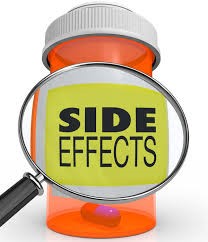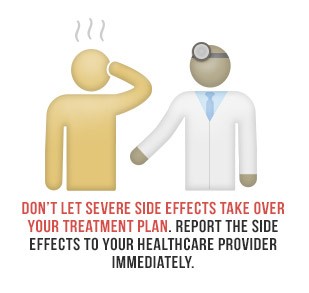Medicines are used to cure or prevent diseases . However medicines have both advantages and risks. Although a medicine has benefits, proven to be effective and safe to use, it still has the potential to cause undesirable effects. These effects are known as side effects. Nevertheless, the benefits of medicines outweigh the risks. This is why it is approved for use for the public.
What Are Side Effects of Medicines?
Side effects of medicines are unintended effect of medicines occurring at normal dose. It can be expected, may bring benefit or harm, and occur depending on how the medicine works in the body. This means that if you experience side effects from one medicine, you are likely to experience similar effects from other medicines that act in the same way with the earlier medicine. Most side effects are unpleasant. A few examples are nausea, dizziness, or gastrointestinal (GI) tract bleeding.
Some side effects are common for certain types of medicines and some are rare. Some side effects may occur soon after you start taking the medicines and some may only appear after few weeks or months. Most side effects usually resolve after few days or weeks of taking the medicines because your body adjusted to the medicines. However, some side effects might not go away until you need to consult your doctor or pharmacist.
How Does Side Effects Differ From Adverse Drug Reaction (ADR)?
ADR is also unintended effect of medicines that occur when taking medicines at a normal and correct dose. However, unlike side effects, it brings harm, not necessarily depend on how the medicine works in the body and cannot be predicted or explained. For example, Aspirin can cause gastritis (side effect) and also serious skin rashes (ADR).
How To Identify Side Effects
When you are taking any new medicines, it’s important for you to be aware and identify if there are any changes or new symptoms in yourself after started taking the medicines. However, it is difficult for you to differentiate between side effects, drug interactions or your underlying medical condition. Therefore you should consult your doctor or pharmacist if there are any changes in yourself after start taking the medicines.
How To Reduce Risks Of Getting Side Effects
- Get to know your medicines. Keep a list of all the prescription or non-prescription medicines you take. Bring it whenever you meet with your doctor or pharmacist to avoid interaction with the newly started medicines.
- Read the label and follow instruction. Take the medicines according to the prescribed dose. Check if you need to take the medicines before or after food, or at any particular times of the day to minimize side effects. Learn to know the common side effects of the medicines by reading the product inserts.
- Know your health and disease history. Make sure you inform your doctor or pharmacist about your health condition, allergies or side effects of medicines that you have experienced before.
- Try to limit the use of non-prescription medicines unless you really need it.
High Risk Patient For Side Effects
- Elderly patients are at higher risk of experiencing side effects. As we grow older, organ function in the body can change and affect the effect of medicines.
- Patients who have a lot of health problems.
- Patients who need to take various types of medicines. Various medicines taken together may cause drug interactions.
- Patients with liver or kidney problems. Problems in the liver or kidney may cause changes in the processing or removal of the medicines from the body. Some medicines may require dose modifications in patients with these impairments.
Examples Of Side Effects
| Side Effects | Medicines Causing Side Effects | How to Reduce / Prevent the Side Effects |
| Nausea and vomiting | Antibiotics, allopurinol, madopar, tramadol | – Take the medicines after food. This may help to minimize the side effects
– Take the medicines along with antiemetic if needed
|
| Gastritis | Aspirin, NSAIDs, corticosteroid | – Take the medicines with food. This may help to minimize the side effects
– Take the medicines along with gastroprotective medicines – Use alternative medicines such as paracetamol as analgesic |
| Drowsiness and sleepiness | Antihistamines such as diphenhydramine (Benadryl), chlorpheniramine | – Take the medicines at night before bed
– Avoid driving or operating heavy machines |
| Constipation | Iron tablet, tramadol, opioids | – Take plenty of fluid or water
– Eat food high in fibre – Take laxative medicines when necessary |
| Hypoglycaemia | Antidiabetics such as gliclazide, glibenclamide, insulin | – Take sugary drinks if experience symptoms of hypoglycemia
– Make sure that you eat after insulin injection |
If side effects are severe or persist, please consult your doctor or pharmacist.
References:
- Understanding side effects of medications. Australian self medications industry inc. June 2011.
- VA centre for medication safety (2006). Adverse drug events, adverse drug reactions and medication errors.
- William smith (2013). Adverse drug reactions. Allergy? Side effects? Intolerance?
| Last Reviewed | : | 17 June 2015 |
| Writer/Translator | : | Norulsaffia bt. Ahmad |
| Accreditor | : | Nor Aida bt. Sanusi |









